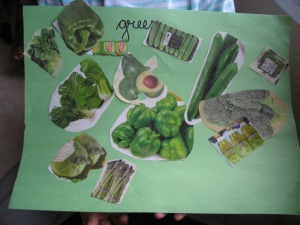
No, you don’t have to bring the teacher flowers. Just wanted to post this pic of these gorgeous sunflowers that I got from a friend for babysitting her children.
School’s in session and it’s my 3rd year not teaching. It’s weird, but kind of nice too.
I’m very much enjoying being at home with Freestyle. Our tentative plan right now is that I’ll be at home (hopefully working part-time at home too) until the baby is old enough to be in a Montessori Toddler program. That is assuming that I can find a job in a Montessori school that will accept both of them too!
I was thinking back to my old students and their families, and thought this would be the perfect time for this:
10 Ways To Be the Parent that Teachers Love!
1. Remember that you and your child’s teacher are partners in your child’s education, as corny as that sounds!
Key word being partners. Know that the teacher is a professional and educated in child development and trust that s/he is working hard for your child’s education.
One of my favourite families that I ever worked with were a very positive and helpful bunch. You could tell that their house was full of laughter and love and their daughter was so sweet, well-adjusted, hard-working, and just altogether lovely. It was absolutely a result from the supportive and positive upbringing that she had, I’m convinced! They were always a pleasure to work with, and very responsive and supportive of me as the teacher. I knew they trusted me with their daughter’s education and were more “hands off” BUT were involved and the one time I mentioned offhand that their daughter had just begun a slightly negative behaviour (something that was very normal for her age), they took it seriously and addressed it immediately. An amazing family and an amazing kid.
2. No “Door Jam Interviews.”
If you have something to talk to your child’s teacher beyond “Tomorrow is Pizza Day, right?” then write a note in your child’s agenda or e-mail (whatever the accepted form of communication) to set up an interview at a mutually convenient time. Mornings are always hectic for teachers and there’s nothing more distracting annoying than a parent trying to engage you in an in-depth discussion of their child’s progress in the doorway while students are coming in and saying good morning, handing in homework, getting their day started, etc.
One time a parent wanted to go over his daughter’s report card right at 9:00am (you know, when class begins). I had to politely but firmly tell him that class had begun and that we would have to arrange an appointment. There’s nothing wrong with being proactive, but you need to consider everyone’s schedules and time it right.
It’s the beginning of the school year and of course you’re anxious to know how your child is adjusting, but the first couple of weeks really is reserved for review and establishing routine so I would wait a until October to have a chat with the teacher about progress. In my old school, we would do an informal phone check-in with parents at the end of October just to let them know how their child was doing and to answer any questions.
Your teacher should make a reasonable effort to meet with you face-to-face (if that is your preference) before or after class time. Go in with a couple of items on your “list” to discuss, but remember that the teacher will probably have a few things to share with you too. What you’re striving for is to end the meeting with a positive outlook on your child’s future and a willingness to collaborate and work together for your child.
3. Inform the teacher of serious illnesses/deaths/incidents/changes in the family.
It’s a difficult time for the entire family and though you may think school will be a place where your child can “escape,” it is very helpful for the teacher to understand if a drastic change in the home has occurred. It doesn’t mean that s/he will go out of the way to address it with the child, but it’s good to have this information in order to be sensitive/aware and to know to keep an extra eye out for any changes in behaviour or personality.
4. Take the time to read daily/weekly updates in your child’s agenda (or the communication channel that the teacher’s established), classroom letters/notes, school newsletters, field trip notes, etc.
Your child should be responsible for asking/reminding you to sign things, but of course, for younger children they will need help, especially in the beginning of the year. You can set up an “in-tray” at home and make it a habit for the child to check their agenda/communication bag and place all field trip notes, etc. into the tray the minute they are home. Please also be mindful of due dates and return things on time too!
5. Set your child up for success for their homework and other take home assignments (e.g. science fair projects).
The teacher will/should provide guidelines and help the child be prepared by going over the project, the objectives, the goals, due dates, etc. At home, your job will be to support your child to accomplish all the tasks on time. This may mean sitting down and planning out when and what they should do each day (in between after-school clubs, soccer practice, violin lessons, etc.). Start early! When we assigned homework on Mondays (due the following Monday), I went through each assignment with the group to make sure they knew what they needed to do and had them write down the due dates in their agendas. I strongly encouraged them to at least go through all the work that night even if they didn’t start because if they had questions they could ask them the next day. I always emphasized that asking questions on a Friday (the last school day before it was due) was unacceptable (of course I would help but didn’t want to encourage procrastination…this is from a master procrastinator!).
6. Do NOT do your child’s work for them.
Seriously, it sounds obvious, but it’s pretty shocking how many parents find it acceptable to actually do the work for the children. And trust me, it’s pretty obvious when this happens (a child who usually needs a lot of encouragement to write neatly suddenly has this picture-perfect science fair project). I know it’s hard, but your job is just to support, not do for them. You want them to learn about atoms, not how to get someone else to do the work for them!
One year, I actually ended up making class time for the students to complete their science fair projects at school because there was a history of heavy parental…involvement (think university-level projects on displays that would be at home in a business meeting!). It was an Upper Elementary class and though our display boards looked less…polished than the Lower Elementary class’ (they brought their projects home), I knew that it was truly their own work and they felt proud of what they had done and learned a lot through the project preparation, which was part of the experience.
7. If you have a problem with something that the teacher is doing, talk to him/her ASAP.
And I specifically mean that you should talk to the teacher first, not go directly to the principal. The teacher is responsible for the class and should be given a chance to resolve the issue with you first.
As aforementioned, ask to schedule an appointment with him/her at a mutually convenient time. To be fair, you should briefly mention why you want to meet. During the meeting, do you best to remain calm and explain exactly what is bothering you. Then, give the teacher time to consider what you’ve said and respond. Make it clear that you’re willing to work with the teacher and the teacher should be doing his/her best to work with you.
If the issue becomes a bigger problem (you don’t agree with each other and it’s a serious enough matter), then by all means, go to speak to the teacher’s supervisor/the administration. However, it is fair that you let the teacher know that you will be doing so. If you’ve both tried to communicate and work together and it still doesn’t work, then the teacher should understand why you are doing this.
8. If you can, help out!
Everyone knows how stretched resources are in schools. Depending on your schedule, keep on the look out throughout the year to see how you can contribute to your child’s school experience. It could mean being a Parent Volunteer on a field trip, helping to sew concert costumes/build the set, bringing in a healthy snack, contributing to class parties, or joining the PTA.
If none of that appeals to you, ask the teacher! I’m sure he or she will have tons of little things in mind! It could be an easy one-off (I remember one parent donated a huge box of paper that his office was getting rid of– the Casa classes used it for cutting exercises and other art activities) or something ongoing (I had an ex-accountant parent help me with a couple of fundraisers that my class would run throughout the year– very helpful as I do not enjoy that type of work and also it was nice to have someone else responsible for that important task while I organized the kids).
Now, if you are truly short on time and money, then what you can do is very simple: make sure you know when the important school events (parent-teacher interviews, holiday concerts, poetry night, etc.) are and make room in your schedule. Parent-teacher interviews are obviously very important, but events such as concerts and science fairs are also important– especially to your child. I will never forget the look on one girl’s face when every single one of her classmates had a family member come to Montessori Day (where they presented a speech about Montessori and then showed their families a lesson and their classwork) except for hers. And it wasn’t that this was a one time thing…it was a common occurrence and I could see it break her. Every. Time.
9. Yes, your child is an angel, but take what they say about others with a grain of salt.
This goes especially for arguments with friends– remember, you’re only hearing one side of the story! Kids may exaggerate or leave out details (both purposely and also because they honestly forget), so just keep that in mind!
Also, as one teacher that I worked with told one of her parents, “I’ll only believe half of what Timmy says about you if you only believe half of what he tells you about me!” Because they tell us a lot about what happens at home. A LOT. 🙂
10. If your child’s teacher has done something that you’ve really liked, especially if he or she has gone above and beyond, let him/her know!
Just a quick note (“Thanks for meeting with Brian early yesterday morning and helping him with his math. We really appreciate your time!”) will suffice. Be specific about what was done and that you appreciate the effort. Trust me, that goes a longer way than random candles and apple-themed teacher paraphenalia at Christmas time.
Any other suggestions from teachers/experienced parents?
Tags: getting organized, how to work with your child's teacher, montessori philosophy, parents' involvement in school, teacher-parent relationships









